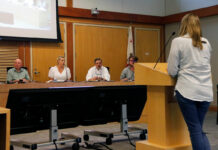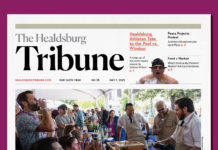Something unusual happened to me recently, and I think it serves a purpose to write about it here. I was attending a Healdsburg Museum opening celebration, and it was lovely. Good wine, good people and a lovely exhibit of local Farm to Table. I was about to leave for another event when someone said “Dr. Anderson, we need you right now!” I ran down the stairs only to find that a woman had passed out, and had briefly, before I got there, become totally unresponsive. You do your training thing, feel for a pulse, check for respirations, etc. She had a very faint and thready, but regular pulse, and was now responding to questions. She was very weak and sweaty. She was perhaps in her fifties, an active and supportive volunteer for the Museum. They were holding her in a sitting position, and I immediately told them to let her lay flat, so that despite her weak pulse, blood would more easily flow to her brain. Sure enough, within a minute or two she became more responsive, less sweaty, and her pulse became stronger. That is when you ask questions about her symptoms prior to this spell. She had no history of heart problems. Earlier she did have some chest pain, maybe some nausea. She had a history of fainting, but not for years. It was a very scary situation for her and for her friends who had seen this happen. So I had to make a decision about what was the next step for her. I will get back to her situation in a moment, but let’s go on to phase two.
We left the Museum, and drove up to Silver Oak Winery for a Geyserville Chamber event. We started to walk in and some one said “Dr. Anderson, come here quickly.” Sure enough, there was a man, this time my friend, lying on the ground with people around him. He had felt faint, tried to sit down but had collapsed, hitting his head. Once again, you do your training thing. He was laying flat, was conversing, breathing fine, and had a strong regular pulse, stronger by far than the lady had earlier. But he too was quite sweaty. I put his legs up, asked questions about chest pain, breathing difficulty, heart problems. Mostly negative answers this time. He had a blow to the head but it seemed minor. He had a tender and swollen leg, presumably from a skin infection. So once again I had to make a decision about what was the next step for him.
So here is the difference between the two cases, which in many ways were medically very, very similar: I told the first patient she had to go to the Emergency Room to be evaluated and she said, with absolute fear on her face, “I can’t, I don’t have medical insurance.”
I told the second patient he had to go to the Emergency Room to be evaluated and he said “All right.” He has Medicare.
This difference is appalling to me. I had a very fitful night, and slept very poorly, as I could not help thinking about the barrier, the wall, the chasm, that prevented this lady from getting the care she needed. I did convince her to go to an Urgent Care center, where costs may have been somewhat lower than an emergency room, and I heard later that she was OK, but she needs further testing. And the same barrier, wall and chasm exist for her there as well.
This is wrong folks, this is wrong. Everyone needs access to medical care without fear of cost. I hope on Jan. 1, 2014, when the Affordable Care Act begins, that this woman, and millions more like her, will be fully covered. I wish it had been so before this happened.
In the mean time, I have asked my former partners at Healdsburg Primary Care to look after her, if she needs it, and see that she gets proper evaluation and care, at no cost to her. They have kindly agreed to do so.
David Anderson, MD is a retired Healdsburg physician.








